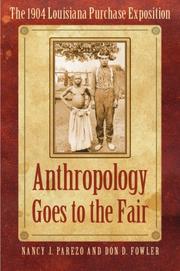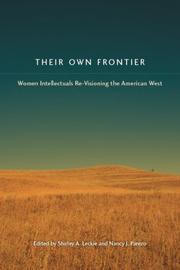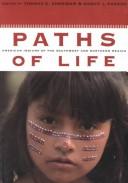| Listing 1 - 8 of 8 |
Sort by
|
Book
ISBN: 0826312969 Year: 1991 Publisher: Albuquerque (N.M.) : University of New Mexico press,
Abstract | Keywords | Export | Availability | Bookmark
 Loading...
Loading...Choose an application
- Reference Manager
- EndNote
- RefWorks (Direct export to RefWorks)

ISBN: 1281092304 9786611092306 0803213948 9780803213944 9780803237599 0803237596 9781281092304 6611092307 Year: 2007 Publisher: Lincoln : Baltimore, Md. : University of Nebraska Press, Project MUSE,
Abstract | Keywords | Export | Availability | Bookmark
 Loading...
Loading...Choose an application
- Reference Manager
- EndNote
- RefWorks (Direct export to RefWorks)
As scientists claiming specialized knowledge about indigenous peoples, especially American Indians, anthropologists used expositions to promote their quest for professional status and authority. This title shows how anthropology showcased itself ""to show each half of the world how the other half lives"".
Human zoos --- Public opinion --- Indians of North America --- Indians in popular culture --- Popular culture --- Ethnological expositions (Human zoos) --- Expositions, Ethnological (Human zoos) --- Zoos, Human --- Ethnology --- Public opinion. --- History. --- Exhibitions. --- McGee, W. J., --- Louisiana Purchase Exposition --- Ruijiana Kōbai Kinen Bankoku Hakurankai --- Saint Louis World's Fair --- Sento Rui Bankoku Hakurankai --- St. Louis. --- St. Louis World's Fair --- United States of America Universal Exposition Saint Louis --- Universal Exposition --- Weltausstellung in St. Louis --- World's Fair --- Сусветная выстаўка --- Susvetnai︠a︡ vystaŭka --- Exposición Universal de San Luis --- Exposition universelle --- Verdensutstillingen i St. Louis --- Exposição Universal --- Exposição Universal de St. Louis --- Всемирная выставка --- Vsemirnai︠a︡ vystavka --- Izložba kupovine Louisiane --- Världsutställningen i Saint Louis --- Världsutställning i Saint Louis --- Всесвітня виставка --- Vsesvitni︠a︡ vystavka --- St. Louis Exposition --- United States --- Race relations. --- Ethnic relations. --- Race question --- Ethnographic shows

ISBN: 1281734047 9786611734046 0803222599 9780803222595 9780803229587 0803229585 9781281734044 661173404X Year: 2008 Publisher: Lincoln : University of Nebraska Press,
Abstract | Keywords | Export | Availability | Bookmark
 Loading...
Loading...Choose an application
- Reference Manager
- EndNote
- RefWorks (Direct export to RefWorks)
The ten women intellectuals showcased in this volume were pioneers in the writing of Indian-centered history, ethnology, and folklore that incorporated the insights, voices, and perspectives of American Indians. These authors not only produced significant works that are still useful to modern-day scholars; they also pioneered research methods and theoretical concepts that helped lay the foundation for the new scholarship on western history, American Indian studies, and ethnohistory. Noted scholars have provided individual biographies describing the struggles and contributions these foremothers
Indians of North America --- Indians in literature. --- Women historians --- Women authors --- Women folklorists --- Women anthropologists --- American aborigines --- American Indians --- First Nations (North America) --- Indians of the United States --- Indigenous peoples --- Native Americans --- North American Indians --- Indians of Central America in literature --- Indians of Mexico in literature --- Indians of North America in literature --- Indians of South America in literature --- Indians of the West Indies in literature --- Historians --- Women scholars --- Authors, Women --- Female authors --- Women as authors --- Authors --- Women and literature --- Folklorists, Women --- Folklorists --- Anthropologists, Women --- Anthropologists --- Women social scientists --- Study and teaching. --- Research. --- Culture --- Ethnology --- Research

ISBN: 0816515492 0816514666 Year: 1996 Publisher: Tucson, Ariz. University of Arizona Press
Abstract | Keywords | Export | Availability | Bookmark
 Loading...
Loading...Choose an application
- Reference Manager
- EndNote
- RefWorks (Direct export to RefWorks)
Ethnology. Cultural anthropology --- History of Latin America --- Southern Paiute --- Apache [culture or style] --- Havasupai --- Tohono O'Odham --- Pima [Native American] --- Hopi [culture or style] --- Seri [culture or style] --- Walapai --- Yavapai --- Yuman [culture or style] --- Mayo [Native American style] --- Tarahumara --- Yaqui [culture or style] --- Mexico
Book
ISBN: 1607813106 1607812835 9781607812838 9781607812821 1607812827 9781607813071 1607813076 9781607813101 Year: 2014 Publisher: Salt Lake City : University of Utah Press,
Abstract | Keywords | Export | Availability | Bookmark
 Loading...
Loading...Choose an application
- Reference Manager
- EndNote
- RefWorks (Direct export to RefWorks)
"Archaeology in the Great Basin and Southwest is a compilation of papers by friends and colleagues that honor Don D. Fowler. The volume encompasses the breadth and depth of Fowler's work in archaeology and sister disciplines with original scholarship on the human past of the arid west. Included are theoretical, methodological, and empirical papers that synthesize and present fresh perspectives on Great Basin and Southwest archaeology and cover a sweep of topics from Paleoindian research to collaboration with Native Americans. Fowler has continually reminded scholars that to understand the past we must know how the local and specific is regionally and transculturally contextualized, how what we know came to be recognized, studied, and interpreted--in short, how the past still affects the present--and how regional and topical archaeology is part of a disciplinary endeavor that is as concerned with rigorous and inclusive knowledge production as it is with site description and cultural syntheses. Readers will learn about the nature of archaeological careers, how archaeology has been conceptualized and conducted, the strengths and limitations of past and present approaches, and the institution building and political processes in which archaeologists engage. Contributors posit new thoughts designed to stimulate new lines of research and reflect on the state of our current knowledge about a wealth of topics. Each paper asks four questions about what Great Basin and southwestern archaeologists currently know: Where have we been? Where are we now? What do we still need to learn? Where are we going? This comprehensive volume will be of interest to those practicing or teaching archaeology and to students seeking to understand the intricacies of Great Basin and Southwest archaeology. "--
SOCIAL SCIENCE / Archaeology. --- Paleo-Indians --- Indians of North America --- Archaeology --- Archeology --- Anthropology --- Auxiliary sciences of history --- History --- Antiquities --- Paleo-Americans --- Paleo-Amerinds --- Paleoamericans --- Paleoamerinds --- Paleoindians --- Stone age --- Indians --- Prehistoric peoples --- Antiquities. --- Southwest, New --- Great Basin --- Excavations (Archaeology) --- Fouilles (Archéologie) --- Indiens d'Amérique --- Indiens du paléolithique --- Antiquités --- Grand Bassin --- Etats-Unis (Nouveau Sud-Ouest)
Book
ISBN: 0824070933 Year: 1991 Publisher: New York London Garland Publishing
Abstract | Keywords | Export | Availability | Bookmark
 Loading...
Loading...Choose an application
- Reference Manager
- EndNote
- RefWorks (Direct export to RefWorks)
Book
Year: 1995 Publisher: New York (N.Y.) : Wenner-Gren foundation for anthropological research,
Abstract | Keywords | Export | Availability | Bookmark
 Loading...
Loading...Choose an application
- Reference Manager
- EndNote
- RefWorks (Direct export to RefWorks)
Anthropological archives --- Anthropology --- Archival resources --- Congresses. --- Research --- Administration
Book
Year: 1992 Publisher: New York : Wenner-Gren Foundation for Anthropological Research,
Abstract | Keywords | Export | Availability | Bookmark
 Loading...
Loading...Choose an application
- Reference Manager
- EndNote
- RefWorks (Direct export to RefWorks)
Anthropological archives --- Anthropology --- Archival resources --- Congresses. --- Research --- Administration
| Listing 1 - 8 of 8 |
Sort by
|

 Search
Search Feedback
Feedback About UniCat
About UniCat  Help
Help News
News